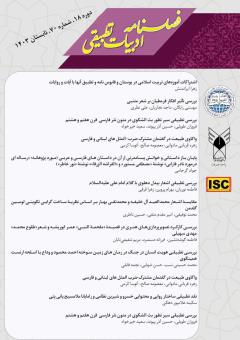بررسی تطبیقی هویت انسان در جنگ در رمان های زمین سوخته احمد محمود و وداع با اسلحه ارنست همینگوی
محورهای موضوعی : شعرمحمد حسینی نسب 1 , حسن شهابی 2
1 - دانشجوی رشته ادبیات انگلیسی دانشگاه آزادکرمان است.
2 - استادیار گروه زبان انگلیسی دانشگاه آزاد اسلامی واحد کرمان ،کرمان،ایران
کلید واژه: پایداری, جنگ, هویت, هستی شناسی,
چکیده مقاله :
چکیده مقاله حاضر به نقد و بررسی مولفه های پایداری و ادبیات جنگ در دو رمان ایرانی و انگلیسی میپردازد تا تفاوتهای فرهنگی و ایدئولوژیک نویسنده آنها را در به تصویر کشیدن هویت انسانی در دوران جنگ در این آثار نشان دهد. برای این منظور دو رمان زمین سوخته احمد محمود و وداع با اسلحه ارنست همینگوی انتخاب شده است تا مفهوم اصلی آنها از نظر ساخت شخصیت های معنادار مورد کنکاش قرار گیرد. نویسنده این مقاله معتقد است تفاوت های بنیادی در نحوه پرداختن به مفهوم انسان، جنگ و هویت اگزیستانسیال در این آثار دیده می شود که در نهایت باعث شکل گیری داستان هایی با پیرنگ های مختلف و هویت های متفاوت می شود که از نظر معرفت شناختی و نوع نگرش به رسالت انسان در ساخت هویت مستقل خود و جهان بینی او در راستای اجرای وظایف انسانی نسبت به سایر انسان ویژگیهای متمایز بیشماری دارند. برای بررسی ساختار هویتی این دو رمان از نظریه هویت اگزیستانسیالیستی ژان پل سارتر استفاده شده است. کلیدواژه ها: پایداری،جنگ،هویت،هستی شناسی
Abstract The present article reviews the components of sustainability and war literature in both Iranian and English novels to show the author's cultural and ideological differences in depicting human identity during the war in these works. For this purpose, two novels, The Scorched Earth by Ahmad Mahmoud and "Farewell to Ernest Hemingway", have been selected to explore their main meaning in terms of constructing meaningful characters. The author of this article believes that there are fundamental differences in how to deal with the concept of man, war and existential identity in these works, which ultimately leads to the formation of stories with different plots and different identities in terms of epistemology and type. Attitudes toward the mission of man in constructing his independent identity and his worldview in order to perform human duties have numerous distinct characteristics compared to other human beings. To study the identity structure of these two novels, the existentialist theory of Jean-Paul Sartre has been used. Keywords: Sustainability, War, Identity, Ontology


